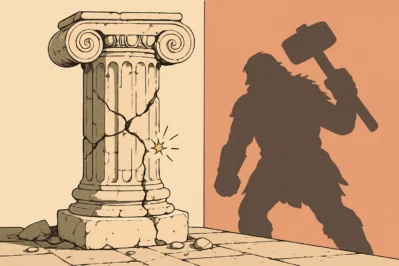Barbarians at the Gates: Debating Cause vs. Catalyst in Korean
Hello, brilliant minds! Welcome back to [Maeil Hangul], where we elevate your Korean to the highest echelons of fluency!
Today, we’re moving beyond everyday conversation and stepping into the grand arena of historical debate. Have you ever watched a documentary or read a book about the fall of a great empire, like Rome, and wondered how to discuss its complex causes in Korean? You’re in the right place. We’re going to tackle a classic question: Were the “barbarian” invasions the cause of imperial decline, or merely a consequence? In Korea, high-level discussions on TV, in university lectures, and among intellectuals often revolve around such nuanced topics. Mastering the language for this will allow you to participate in truly sophisticated conversations.
Let’s sharpen our analytical minds and our Korean vocabulary!
Core Expressions for Historical Debate
Here are the essential phrases you need to discuss history like a Korean academic.
1. 인과관계를 규명하다 (ingwa-gwangye-reul gyumyeong-hada)
* Pronunciation [Romanized]: In-gwa-gwan-gye-reul gyu-myeong-ha-da
* English Meaning: To identify/determine the causal relationship.
* Detailed Explanation: This is a highly academic and formal phrase. 인과관계 (ingwa-gwangye) means “causality” or “cause-and-effect relationship,” and 규명하다 (gyumyeong-hada) means “to ascertain” or “to get to the bottom of.” You use this phrase when you want to talk about the difficult task of proving that one event directly caused another, which is the core of any historical debate.
2. 촉매 역할을 하다 (chongmae yeokhal-eul hada)
* Pronunciation [Romanized]: Chong-mae yeok-hal-eul ha-da
* English Meaning: To act as a catalyst; to play the role of a catalyst.
* Detailed Explanation: This is a sophisticated way to say something sped up a process that was already happening. 촉매 (chongmae) is the scientific term for “catalyst,” and 역할을 하다 (yeokhal-eul hada) means “to play a role.” In history, it suggests an event wasn’t the root cause, but rather the trigger that accelerated an existing trend (like an empire’s internal decay).
3. 복합적인 요인이 작용하다 (bokhap-jeogin yo-in-i jag-yong-hada)
* Pronunciation [Romanized]: Bok-hap-jjeo-gin yo-in-i jak-yong-ha-da
* English Meaning: For complex factors to be at play / to work together.
* Detailed Explanation: This is your go-to phrase for showing you have a nuanced perspective. 복합적 (bokhap-jeok) means “complex” or “composite,” 요인 (yo-in) means “factor,” and 작용하다 (jag-yong-hada) means “to act” or “to have an effect.” It’s the perfect way to argue against a simplistic explanation and state that multiple issues contributed to a historical outcome.
Example Dialogue
Imagine two friends, Min-jun and Ji-hye, discussing a history documentary they just watched.
A (민준): 오늘 본 다큐멘터리 정말 흥미로웠어. 로마 제국의 멸망 원인이 단순히 ‘야만인의 침략’ 때문만은 아니라는 게 명확해졌어.
(Min-jun): The documentary today was fascinating. It became clear that the fall of the Roman Empire wasn’t just due to ‘barbarian invasions.’
B (지혜): 맞아. 둘 사이의 인과관계를 규명하는 건 정말 어려운 문제 같아. 나는 침략이 결정적인 원인이었다기보다는, 이미 진행 중이던 쇠퇴의 촉매 역할을 했다고 생각해.
(Ji-hye): I agree. It seems like determining the causal relationship between the two is a really difficult problem. I think rather than being the decisive cause, the invasions acted as a catalyst for a decline that was already in progress.
A (민준): 내 생각도 그래. 정치적 부패, 경제적 위기, 사회적 분열 같은 복합적인 요인이 작용하고 있었으니까. 침략은 그저 무너져가는 건물에 가해진 마지막 충격이었을지도 몰라.
(Min-jun): That’s what I think, too. Since complex factors like political corruption, economic crisis, and social division were at play. The invasions might have just been the final blow to an already crumbling structure.
B (지혜): 정확해. 역사를 단선적으로 해석하는 건 항상 위험한 것 같아.
(Ji-hye): Exactly. It seems that interpreting history in a linear fashion is always dangerous.
Cultural Tip & Deeper Dive
In Korea, intellectual curiosity is highly valued, and you’ll find numerous TV programs, YouTube channels (like ‘사피엔스 스튜디오’ Sapiens Studio), and public lectures dedicated to deep dives into history, philosophy, and science.
When you watch these programs, you will almost never hear a simple explanation for a major historical event. Instead, commentators and professors will almost always use phrases like “복합적인 요인이 작용했다” to frame their arguments. They do this to show a sophisticated, multi-faceted understanding. Using these phrases yourself in a discussion signals that you are not a novice but a thoughtful analyst. If you want to sound like a true Korean intellectual when discussing history or even current events, arguing that an event was a ‘촉매’ (catalyst) rather than a direct ‘원인’ (cause) is a classic way to demonstrate deep thinking.
Let’s Wrap Up & Practice!
Today, we learned some incredibly useful, high-level Korean expressions to debate the complexities of history.
- 인과관계를 규명하다 (to determine the causal relationship)
- 촉매 역할을 하다 (to act as a catalyst)
- 복합적인 요인이 작용하다 (for complex factors to be at play)
Now, it’s your turn to be the historian!
Practice Question:
Think about a major event in your country’s history. In a short Korean sentence, describe whether a specific trigger event was a direct cause or more of a catalyst, using one of the expressions we learned today.
For example: “저는 그 전쟁이 혁명의 직접적인 원인이기보다는 촉매 역할을 했다고 생각합니다.” (I believe that war acted as a catalyst for the revolution, rather than being its direct cause.)
Leave your insightful analysis in the comments below! I’m excited to see your sophisticated takes on history.






